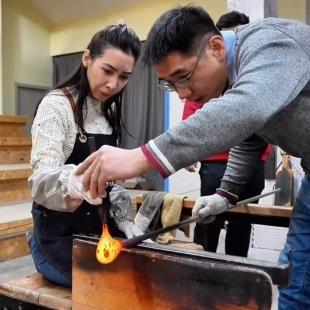Bridging cultures: An Uzbek translator's experience in China


Editor's note: We have asked expats living in China to share their own stories about the cities they work and live in. Eshmanova Iroda Shovkat Kizi is from Uzbekistan and now works as a translator of Uzbek, Russian, English and Chinese in Jinan, capital of Shandong province.
My name is Eshmanova Iroda Shovkat Kizi, and I was born and raised in Tashkent, the capital of Uzbekistan. I have been residing in Jinan, Shandong province, since 2019. In 2023, I graduated with a master's degree in translation and interpreting from Qilu University of Technology in Jinan.
Currently, I work as a translator in various languages including Uzbek, Russian, English and Chinese. I have visited most of the cities in Shandong, and I have found that the people here are kind and warm-hearted.
Jinan is an amazing place to live! The people are friendly and welcoming, the food is delicious, and the culture is rich and vibrant. I've fallen in love with the city and everything it has to offer.
From the bustling markets to the ancient temples, there's always something new and exciting to discover.
And of course, the food is a highlight. Whether it's traditional street food or a fancy restaurant, there's no shortage of mouth-watering dishes to try. All in all, I feel incredibly lucky to call Jinan my home.
When I visited Zibo, I was deeply impressed by the exquisite glazed handicrafts. I discovered that Zibo's Boshan district is a famous hometown of glaze.
So, I decided to visit Yanshen ancient town in the district to experience traditional Chinese handicrafts. Under the guidance of a master craftsman, I burned a glazed swan for my sister and sent it to her. Swans hold special significance in Uzbekistan, as they represent peace.
In March, I gave an interview for Shandong Broadcasting and Television Station regarding my view on this year's “two sessions”.
This annual event offers unique insights into how China works. During the interview, we discussed what foreigners think about the gathering. I believe it attracts global attention because of its special meaning and influence.
Through the event, we can understand China's planning and layout in various fields such as economy, society and culture, and better grasp China's development pulse.
During my research year at the university, I published two articles with the help of my supervisor Yang Hetong. One of them is about the translation of political text between Chinese and English, specifically related to the Belt and Road Initiative (BRI).
Professor Yang also assisted me in attending meetings related to the BRI, which was of particular interest to me, as Uzbekistan is a member of the initiative.
In my point, the initiative has opened up enormous development opportunities for Uzbekistan in the fields of infrastructure development, trade growth, energy development and cultural exchange.




































